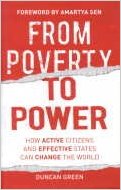Do ‘active citizens’ and ‘effective states’ change the world? According to the sub-title of the book From Poverty to Power by Duncan Green they do. Yet, as the author himself recognizes there is ‘good’ change and ‘bad’ change. What Green means by good change is change that helps ‘build a secure, fair, and sustainable world’ (p. 16).
So what constitutes active citizens and effective states? Green defines active citizens as those who use their rights and obligations that ‘link individuals to the state, including paying taxes, obeying laws, and exercising the full range of political, civil, and social rights’ to ‘improve the quality of political or civic life, through involvement in the formal economy or formal politics, or through the sort of collective action that has allowed poor and excluded groups to make their voices heard’ (p. 12).
Effective states guarantee security, provide rule of law and pursue inclusive economic growth. The author correctly argues that what links active citizens and effective states together is politics and that too often discussions about development are about policy not politics (p. 13). He also argues that an active citizenship and effective state should be pursued as early as possible in a country’s development in order for it to have a chance to result in meaningful change.

